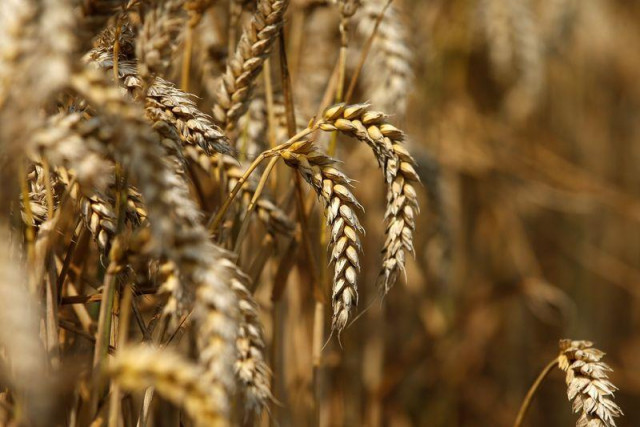PTI govt rejects proposal of banning wheat export
Flour mills were seeking the ban due to damage to the staple crop

PHOTO: REUTERS
Pakistan Flour Mills Association (PFMA) had approached the government, seeking an immediate ban on the export of wheat. However, the government dismissed the proposal keeping in view current wheat stocks in the country, a senior government official told The Express Tribune.
The Ministry of National Food Security and Research emphasised that Pakistan had been self-sufficient in wheat production over the past decade. In the last few years, the wheat harvest has beaten the national requirement, thus, providing surplus produce.
The available stocks of wheat, as reported by provinces on May 13, 2019, stand at 3.7 million tons.
The Federal Committee on Agriculture (FCA) held a meeting on November 10, 2018, and estimated wheat production in the crop year 2018-19 at 25.51 million tons. However, due to recent rains, hail, and windstorms, the wheat production is expected to go down to 24.26 million tons because of a 5% loss.
In order to create physical and fiscal space, the federal government had allowed the export of wheat in the last three consecutive years. On January 29, 2019, the Economic Coordination Committee (ECC) permitted the export of 0.5 million tons of wheat from the stocks held by Pakistan Agriculture Storage and Supplies Corporation (Passco). Later on March 20, it allowed extension in the export time frame from April 30 to June 30, 2019.
The export of wheat and wheat products such as flour, fine flour (maida) and semolina (Suji) was recorded at 213,000 tons from January to May 13, 2019.
Taking into account the recent damage to the wheat crop, especially in Punjab, the PFMA had requested the imposition of a ban on the export of wheat. The Punjab government suggested a review of the domestic and international markets before taking any decision on wheat movement.
The Ministry of National Food Security and Research said while considering the request of the PFMA and Punjab government, the ministry examined the situation and presented its views on wheat availability in the country.
The ministry argued that available wheat, as reported by the provinces and Passco, was well above annual national requirement of around 25.84 million tons. It also stressed that the Punjab government and Passco were engaged in a smooth wheat procurement process.
“There is no need to put immediate ban on wheat export rather the situation should be monitored every week,” it said.
The ministry called for keeping a close watch on wheat availability, local and international wheat prices, monitoring the rupee-dollar parity and reporting to the ECC every week.
The ECC decided that due to sufficient availability of wheat in the country, there was no need to impose a ban on exports and directed the Ministry of National Food Security to strictly monitor wheat availability in the country, its prices locally and internationally and also review the rupee-dollar parity.
Published in The Express Tribune, June 4th, 2019.
Like Business on Facebook, follow @TribuneBiz on Twitter to stay informed and join in the conversation.



















COMMENTS
Comments are moderated and generally will be posted if they are on-topic and not abusive.
For more information, please see our Comments FAQ